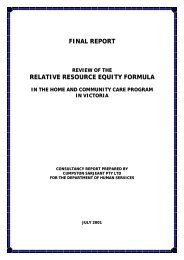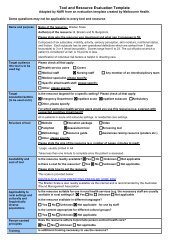Guide to Complaint Handling in Health Care Services
Guide to Complaint Handling in Health Care Services
Guide to Complaint Handling in Health Care Services
You also want an ePaper? Increase the reach of your titles
YUMPU automatically turns print PDFs into web optimized ePapers that Google loves.
Deal<strong>in</strong>g with difficult<br />
situations<br />
Some compla<strong>in</strong>ts are not easily dealt with. Be<strong>in</strong>g confronted<br />
with someone who is angry or emotional can<br />
be personally quite hard. Different staff members will<br />
have a different response, depend<strong>in</strong>g on their <strong>in</strong>dividual<br />
personalities, life experience and the other pressures<br />
they are deal<strong>in</strong>g with at the time. Nevertheless, it is<br />
important <strong>to</strong> try <strong>to</strong> rema<strong>in</strong> calm and not get caught<br />
up <strong>in</strong> the heat of the moment. The conflict will be<br />
resolved more quickly if the staff member keeps a<br />
clear head.<br />
There are a variety of reasons why people might<br />
be upset or difficult <strong>to</strong> deal with <strong>in</strong> a health sett<strong>in</strong>g.<br />
For example, they may be frustrated at delays, they<br />
may be worried about what’s happen<strong>in</strong>g, they might<br />
be <strong>in</strong> pa<strong>in</strong>, and they might be confused. Some people<br />
have a ‘short fuse’ and are quicker <strong>to</strong> react <strong>to</strong> these<br />
feel<strong>in</strong>gs – sometimes this is based on previous bad<br />
experiences.<br />
They may also be struggl<strong>in</strong>g with language difficulties<br />
and not understand what is be<strong>in</strong>g said. Even if<br />
their first language is English, people may not understand<br />
technical medical language.<br />
Whatever the reason, don’t assume the ‘difficult’<br />
person is be<strong>in</strong>g unreasonable. Apply the same standards<br />
of communication <strong>to</strong> them as you would <strong>to</strong><br />
anyone ask<strong>in</strong>g a question or express<strong>in</strong>g a concern<br />
calmly. Very often, all that is needed is someone <strong>to</strong><br />
take time <strong>to</strong> talk <strong>to</strong> the person, listen <strong>to</strong> their concerns<br />
and tell them what is happen<strong>in</strong>g.<br />
focuss<strong>in</strong>g on the person’s emotions or behaviour and<br />
how <strong>to</strong> control it.<br />
Us<strong>in</strong>g assertive language <strong>to</strong> manage<br />
aggression<br />
Another strategy for deal<strong>in</strong>g with someone who is<br />
be<strong>in</strong>g aggressive is <strong>to</strong> use assertive language. This is<br />
not the same as be<strong>in</strong>g aggressive <strong>in</strong> response.<br />
Sometimes the staff member will need <strong>to</strong> manage<br />
their own anger.<br />
One way of do<strong>in</strong>g this is <strong>to</strong> use neutral language<br />
while you are speak<strong>in</strong>g <strong>to</strong> the aggressive person. Also,<br />
be clear about how you can help – tell them what you<br />
can do, not what you can’t.<br />
Be<strong>in</strong>g assertive <strong>in</strong>volves:<br />
• Use neutral <strong>to</strong>ne and pitch.<br />
• Avoid emotive words and labell<strong>in</strong>g the other<br />
person.<br />
• Avoid sentences beg<strong>in</strong>n<strong>in</strong>g with ‘you’ or words like<br />
‘should’ or ‘must’.<br />
• Don’t become apologetic.<br />
Get help if needed<br />
There will be occasions when someone becomes<br />
physically threaten<strong>in</strong>g. If this happens the staff member<br />
will need help from other staff. Occasionally staff<br />
will need <strong>to</strong> call security or the police. The organisation<br />
should have clear pro<strong>to</strong>cols about when security<br />
should be called and how this happens.<br />
Us<strong>in</strong>g empathy <strong>to</strong> diffuse anger<br />
Empathy is the ability <strong>to</strong> understand another person’s<br />
thoughts and feel<strong>in</strong>gs from their perspective. Often<br />
people are angry because no one has listened <strong>to</strong> them<br />
properly – they may be hurt or frustrated under their<br />
anger. It is therefore important <strong>to</strong> listen without<br />
<strong>in</strong>terruption <strong>to</strong> what the person is say<strong>in</strong>g – even if<br />
they are swear<strong>in</strong>g or be<strong>in</strong>g <strong>in</strong>coherent at times.<br />
Once the person has had a chance <strong>to</strong> express their<br />
po<strong>in</strong>t of view, you may need <strong>to</strong> ask questions <strong>to</strong><br />
clarify. Remember, however, that <strong>to</strong>ne of voice is<br />
extremely important. Try not <strong>to</strong> make the person feel<br />
that you are cross-exam<strong>in</strong><strong>in</strong>g them – rather, make it<br />
clear that you are ask<strong>in</strong>g questions out of a desire <strong>to</strong><br />
help.<br />
Some useful phrases are:<br />
• ‘Yes, I see’ (while listen<strong>in</strong>g).<br />
• ‘I appreciate what you are say<strong>in</strong>g’.<br />
• ‘I just want <strong>to</strong> check that I have unders<strong>to</strong>od you<br />
correctly’ (repeat or paraphrase back <strong>to</strong> them).<br />
However, it is most important not <strong>to</strong> simply placate<br />
an angry person. Treat their compla<strong>in</strong>t seriously<br />
and try <strong>to</strong> focus on the issue at hand rather than<br />
<strong>Compla<strong>in</strong>t</strong> handl<strong>in</strong>g skills 27

















